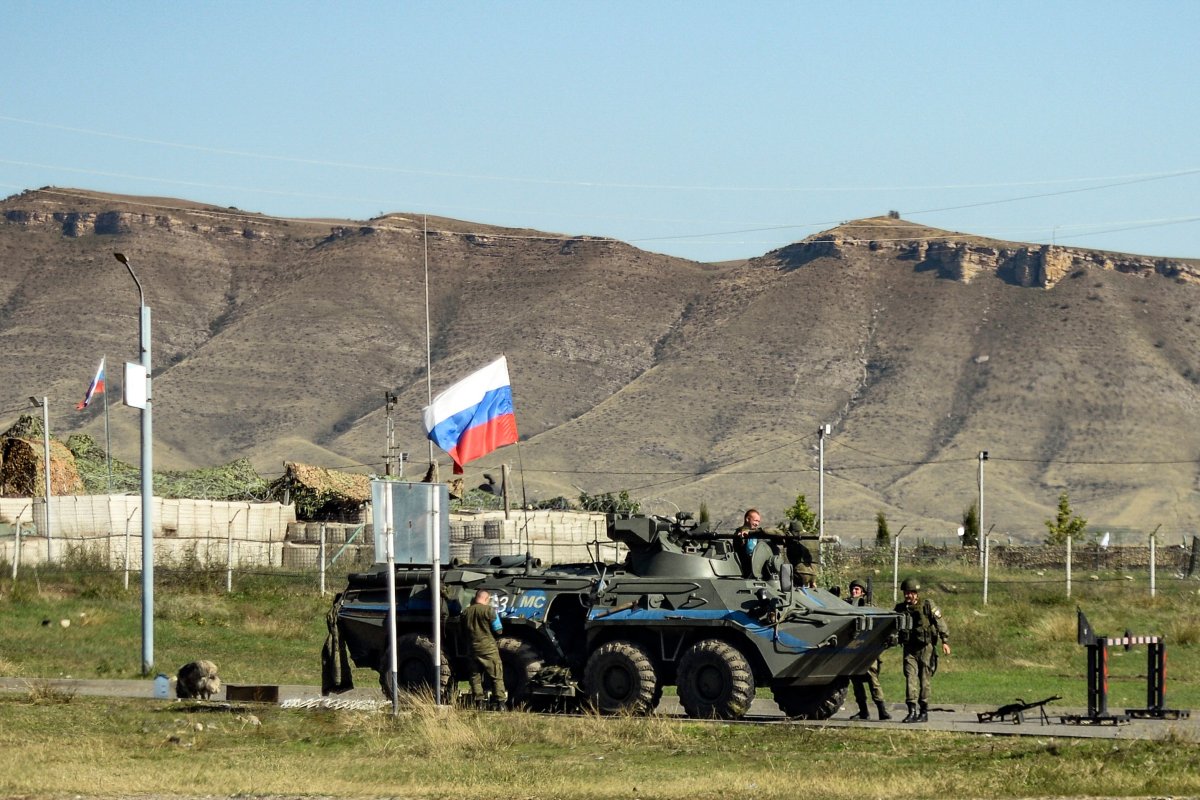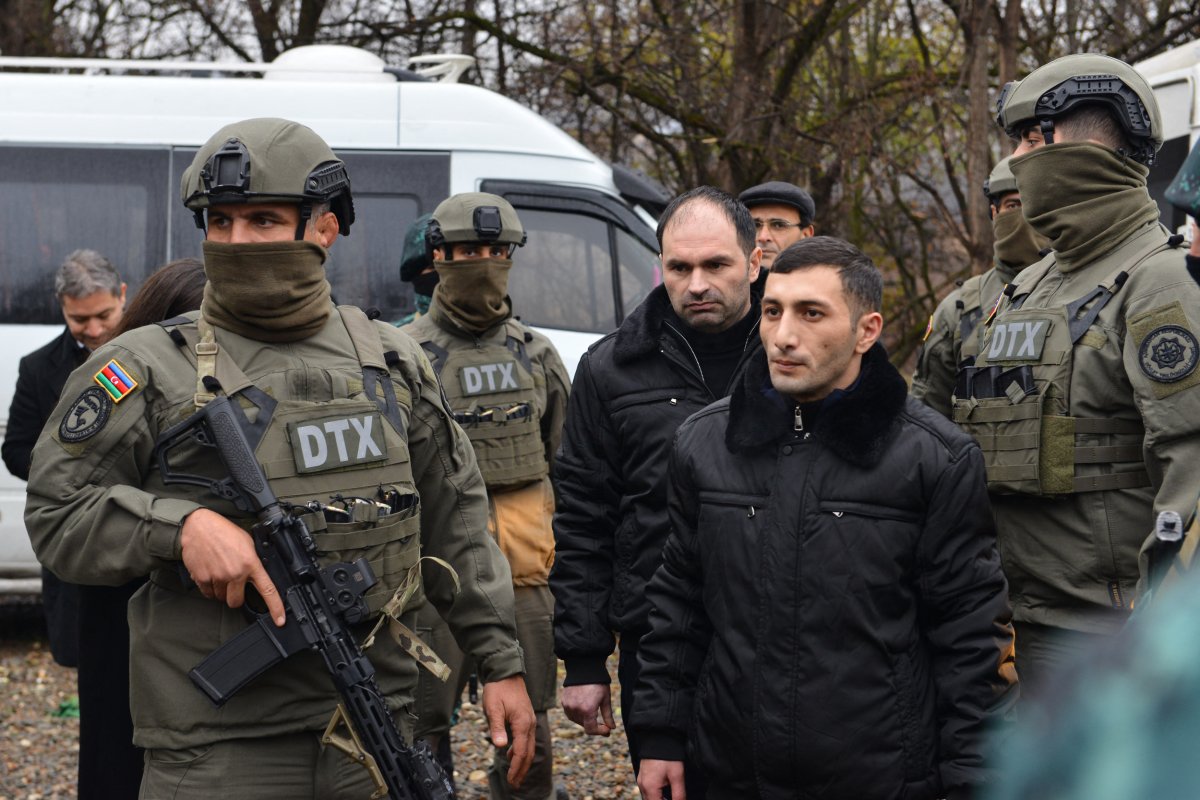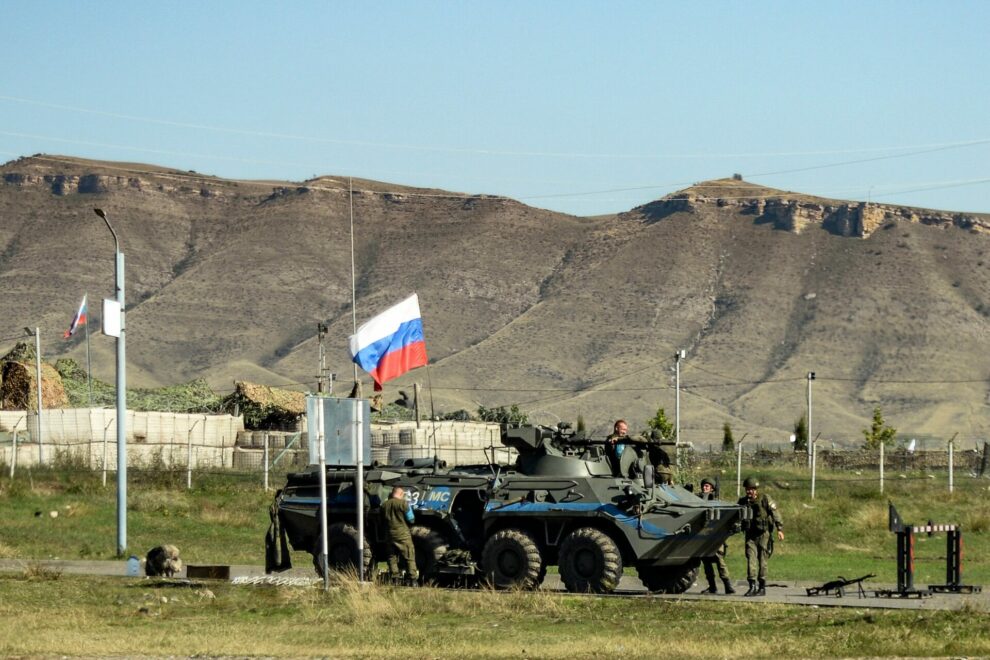Members of President Joe Biden‘s administration need to adopt “different attitudes” before the White House can play a mediating role in thorny—and strategically vital—peace talks between Azerbaijan and Armenia, a top official has said.
Speaking at a briefing with a small group of journalists in London on Tuesday, Hikmet Hajiyev—the top foreign affairs adviser to Azerbaijani President Ilham Aliyev—warned that a “lopsided” American stance on the decades-long Nagorno-Karabakh dispute has caused “concern” in Baku.
Azerbaijan is becoming as a key battleground for Western, Russian, Iranian, and Chinese competition in the South Caucuses and Caspian Sea regions. The oil- and gas-rich nation is emerging as a key Western energy partner amid Russia’s war on Ukraine, but concerns remain about human rights abuses and Baku’s close relations with Moscow.
“We do expect that there could be some different attitudes…demonstrated by the United States executive branch of government,” Hajiyev told Newsweek.
Newsweek has contacted the White House by email to request comment.

War and Peace
Baku and Yerevan are now negotiating an end to decades of conflict and several territorial disputes. Most notable among them is related to the ethnically Armenian Nagorno-Karabakh region, which is internationally recognized as Azerbaijani territory. A 23-hour conflict in September saw Baku seize control of the enclave and dismantle the Yerevan-aligned Republic of Artsakh.
Aliyev’s administration has accused Washington of being “biased” in favor of Armenia. His officials have refused to take part in peace talks held in the U.S.
In November, Baku protested after U.S. Assistant Secretary of State for European and Eurasian Affairs James O’Brien told a Congressional hearing that the State Department “has made it clear to Azerbaijan that there cannot be business as usual in our bilateral relationship” after its seizure of Nagorno-Karabakh.
“The United States has condemned Azerbaijani actions in Nagorno-Karabakh, canceled high-level bilateral meetings and engagements with Azerbaijan, and suspended plans for future events,” O’Brien said.
Hajiyev said O’Brien’s intervention was not helpful. “The approach was not balanced and also didn’t demonstrate a quite objective position with regard to the history of the 35-year-long conflict,” he said. “It was a one-sided and lopsided approach, which caused concern in Azerbaijan.”

O’Brien visited Baku earlier this month in a bid to ease tensions, writing on X—formerly known as Twitter—that the visit was “positive and constructive.”
But the U.S.-Azerbaijan spat goes beyond the State Department. Since 1992, Baku has contacted with the “Section 907” measure blocking American aid to Azerbaijan in response to its blockade of Armenia during the First Nagorno-Karabakh War. Each year since 2002, the White House has issued a waiver to send aid despite ongoing conflicts over the enclave.
“We have not and do not anticipate submitting a waiver on 907,” O’Brien told Congress in November. U.S. lawmakers, meanwhile, are pushing for further measures. The Senate voted unanimously in November to suspend military assistance to Baku, though the House did not take up the proposal.
Hajiyev said the issue remains a frustration in Baku, describing Section 907 as “incomprehensible” and “one of the most unfair, unjust amendments in the history of the U.S. Congress.”
“Azerbaijan doesn’t need any foreign aid or support,” he said. “Azerbaijan is a self-sufficient country. But here the psychological aspect and political aspect is very important, because it was unfair treatment of Azerbaijan.”
The dispute, the foreign affairs adviser added, makes it difficult to work with Washington on any peace deal with Armenia. “We do expect that there could be some different attitudes… demonstrated by the United States executive branch of government,” Hajiyev said.
“Once it’s done and we don’t have any problems, [we can] continue our discussions on the Washington platform and with regard to peace discussions.”
Friends and Foes
Around 2,000 Russian peacekeepers, deployed to Nagorno-Karabakh area after the 2020 conflict between the two nations, proved unable to prevent resurgent tensions. Hajiyev said Moscow and its local forces were given a 10-minute warning before the September “anti-terrorist” effort began. Several peacekeepers were killed in the crossfire of the short operation.
Neither Moscow nor Yerevan stepped in to stop the rout. Years of tensions between the Kremlin and Armenian Prime Minister Nikol Pashinyan have poisoned the fraying alliance between the two Collective Security Treaty Organization (CSTO) member states, while growing cooperation between Moscow and Baku have raised suggestions that Russian President Vladimir Putin has dropped Armenia in favor of its long-term rival.
“It’s yet another false narrative pursued by the Armenian side,” Hajiyev said of suggestions that the September operation was coordinated with Moscow. “We didn’t have any plan for the start of this operation…We had been left with no other choice.”
Baku was not surprised with the lack of a Russian response, the official added. “Legitimacy was on the side of Azerbaijan,” he said.
Armenia and Azerbaijan conducted a prisoner exchange last week, in what was touted as a diplomatic breakthrough and a significant step on the road to a comprehensive peace deal.
Hajiyev said it is “very difficult” to predict the next breakthrough and noted there remain “issues that need to be discussed.” Still, he added: “I think we are much closer to the peace agenda…we don’t see any longer major problematic issues.”
“It’s not nuclear physics, it’s not rocket science,” Hajiyev said. “What we are talking about are very basic principles of international law.”

“Azerbaijan restored its full sovereignty and territorial integrity. We are facing a completely new reality in our region. Now the strategy of Azerbaijan is to win the peace. And winning the peace requires action from both sides, like a tango.”
Azerbaijan is maintaining its “regional solutions to regional problems” mentality, disputing the need for any outside mediation.
“The seeds of the peace are lying in our region, in Baku and in Yerevan,” Hajiyev said. “Our other partners can help us to move forward, but sometimes we are finding ourselves in a situation where we are trying to mediate between the mediators.”
Baku, Hajiyev added, is “not excluding” peace talks held in Washington, Moscow, or Brussels. But, he said, “It doesn’t matter where we are meeting, the important thing is [whether] it is result-oriented and what’s on our agenda.”
Baku sees no need for further fighting, the official continued, dismissing concerns that Azerbaijani forces might undertake an operation into southern Armenia to carve out a land bridge to its Nakhchivan exclave.
“We see false alarmism and hysteria [from] Armenia’s side, and we also see the narrative of some partners, [as to] whether Azerbaijan has some other intentions,” Hajiyev said. “Azerbaijan no longer has any military goals. For us, war and confrontation is over. We achieved what we deserved to achieve.”
But now Baku and Yerevan must juggle the difficult challenges of peace, including a settlement on the right of return for some 100,000 people Armenia said fled Nagorno-Karabakh during the September fighting.
“Azerbaijan is proud to have a multiethnic society where different ethnic minorities are living side by side in peace,” Hajiyev said. “The same conditions can be provided to Armenians who are living in Karabakh.”
“But what we said is that we cannot accept aggressive separatism, we cannot accept the so-called Nagorno-Karabakh Republic, and we cannot accept also forces on the ground.”
Source: News Week










